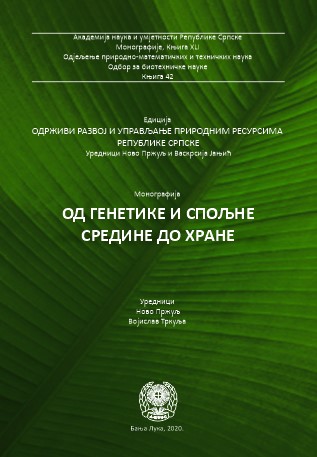Current status and perspectives of developement of vegetable crop production in the Republic of Srpska
DOI:
https://doi.org/10.7251/EORU2001489TKeywords:
Vegetable growing, sustainable production systems, agro-technical and agro-ecological measuresAbstract
Climate changes and their impact on flora and fauna are an aggravating factor for agriculture, with a particularly negative impact on cultivated vegetables. The complexity of the problem of the adaptation of vegetable production to climate changes requires new knowledge, a holistic approach to innovative vegetable production technologies with a significant share of agro-ecological measures with respect for natural biological cycles. Climate changes will significantly affect and change vegetable production from the introduction of new species and genotypes, the adaptation of agrotechnical measures to changing dynamics of production. The rapidity and overall possibility of change depends on the current state of vegetable production, the adoption of sustainable production systems and new concepts of healthy eating. Vegetable production in the Republic of Srpska has a long tradition, where about 30-40 different types of vegetables are grown, including the less widespread ones. The characteristics of agricultural production in the Republic of Srpska are low productivity, unfavorable farm structure, insufficient and poor technological equipment, dependence on imports of mainly all inputs needed for production, as seed material, plant protection products and mineral fertilizers, equipment and agricultural machinery. Agricultural land in the Republic of Srpska occupied 1,251,691 hectares, of which 893,540 hectares are arable, of which 614,264 hectares are under arable land and gardens. Of the total arable land, about 10% is sown by vegetable species. The largest amount of production is in the open field, in gardens and fields. Vegetable production in our country has all the characteristics of production in the region of Southeast Europe, but there are also modern systems that are at the level of developed countries. The underdeveloped food industry, uncertain marketing, limited markets and small exports are the main causes of the slow development of vegetable production. In addition, small parcels, a large share of human labor, lack of specialized vegetable mechanization, slow introduction of innovations, insufficient education and knowledge of producers make vegetable production expensive and uncompetitive. The chances for improvement are the introductionof new technologies, which should be seen as tools for changes in production methods and in the application of agri-environmental measures. Changes need to be made through the farmer's production system with a balanced crop and livestock production ratio and adapted to different vegetable production methods. Part of these changes requires a fundamental change in production methods, because the future of agriculture is sustainable eco-systems that produce high-quality, safe and diverse vegetables with the rational use of natural resources and the protection of biodiversity.
